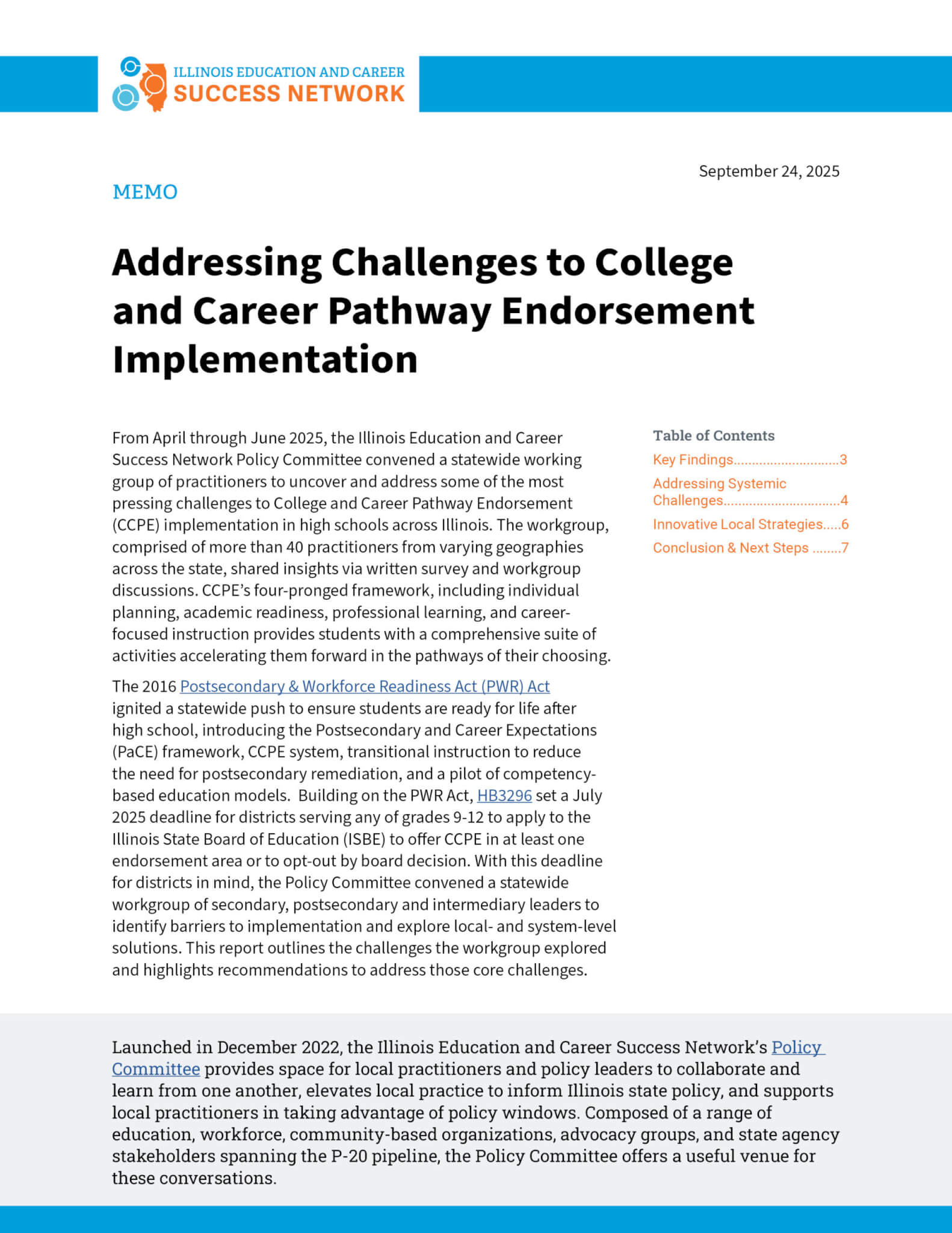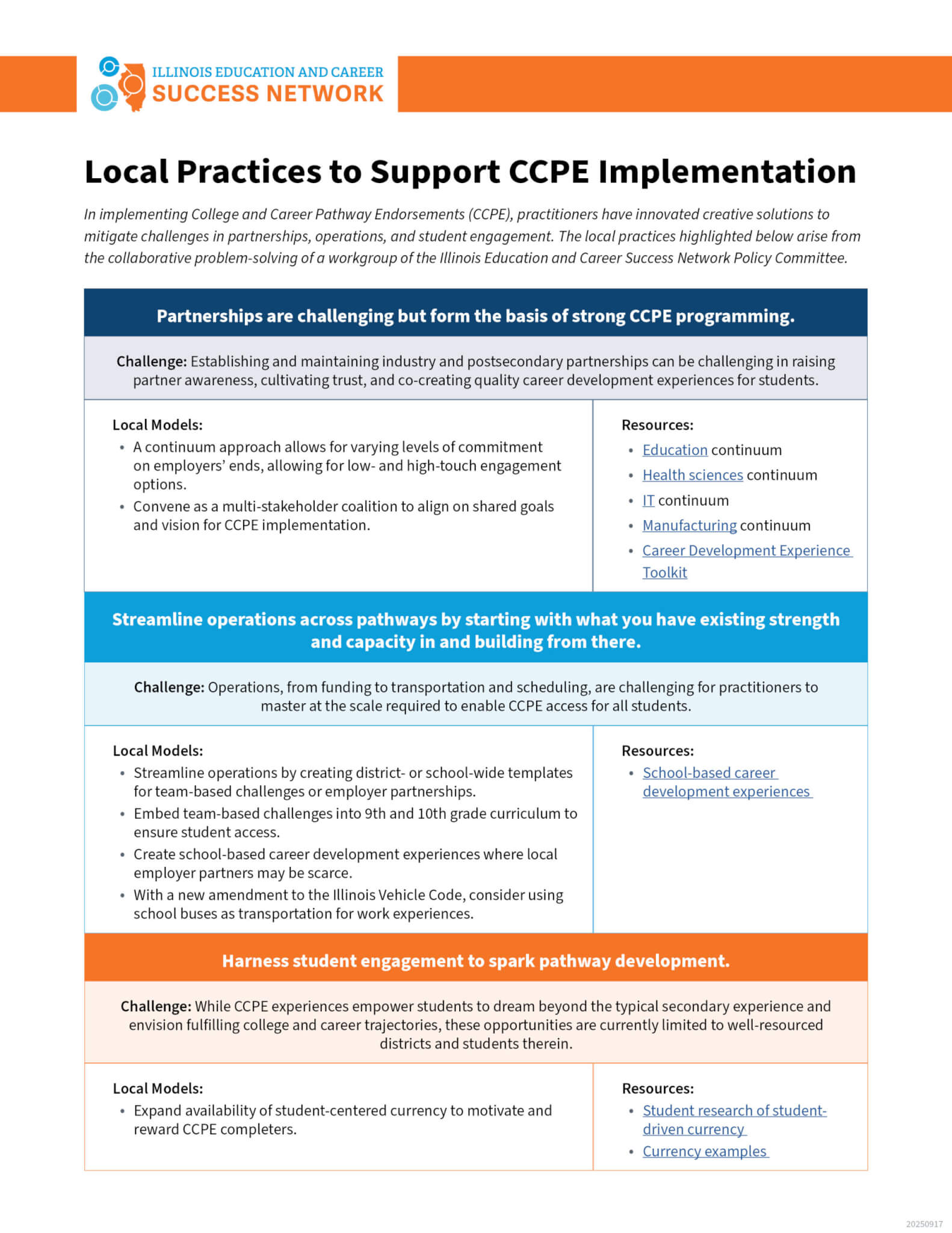Despite offering numerous benefits to students in accelerating postsecondary planning and success, College and Career Pathway Endorsements (CCPE) have struggled to scale in districts across the state due to implementation hurdles for practitioners. A workgroup of the Illinois Education and Career Success Network’s Policy Committee focused on identifying these challenges to CCPE implementation and potential local and systemic solutions. The workgroup’s findings are now available in a new memo and one-page summary, and are outlined below.

Memo
Addressing Challenges to College and Career Pathway Endorsement Implementation

Summary
Local Practices to Support CCPE Implementation
CCPE Workgroup
Over the spring of 2025, the Success Network Policy Committee brought together more than 40 educators, administrators, and intermediaries from across Illinois to address a pressing challenge: expanding and strengthening CCPE in high schools statewide.
The endorsements, rooted in the four pillars of individual planning, academic readiness, professional learning, and career-focused instruction, offer students meaningful experiences that prepare them for success in college, career, and beyond. After nearly a decade of the 2016 Postsecondary and Workforce Readiness (PWR) Act and a July 2025 deadline for high school districts under Public Act 102-0917 to commence or opt out of implementing CCPE, the timing of this workgroup was crucial for surfacing challenges to implementation and ideating local and systemic solutions. The Policy Committee, staffed by EdSystems in collaboration with Advance Illinois and the Illinois Student Assistance Commission (ISAC), is now publishing a new memo outlining implementation challenges as well as promising practices on a local level and recommendations for reform at the systems level.
Challenges to CCPE Implementation
Effective CCPE programming opens a world of opportunities for students at a pivotal time in their academic journeys. However, as practitioners have learned, the work of standing up quality pathways can prove difficult even when many of the component parts of CCPE already exist within a school or district.
Successful pathways require intentional and sustainable partnerships with local employers and institutions of higher education. Facilitating student engagement with these partners depends on seamless operations in areas such as transportation, planning, and data collection. District and employer resource constraints may limit equitable access to CCPE for all students, which is often exacerbated by unpaid career development experiences, such as internships. Finally, when these issues are resolved, packaging the CCPE for approval in the statewide process is, according to practitioners, sometimes the most challenging step of all.
Promising Local Practices
CCPE represents a paradigm shift in how high school students are accelerated toward success in college and career. As such, much of the work on a local level is in “shifting human systems,” as one workgroup member framed it, to provide students with engaging and high-quality opportunities in their chosen pathways.
To achieve this shift, practitioners recommend:
- Focusing on partnerships as the foundation of strong CCPE programming, including using a continuum approach to allow for varied levels of employer engagement.
- Streamlining operations across pathways by starting with existing areas of strength and building capacity from there, such as school-based career development experiences.
- Harnessing student engagement to spark pathway development, such as surveying students to identify relevant currency for their interests and needs.
Systemic Recommendations
To address implementation challenges on a systems level, workgroup members identified four key strategies for policymakers to consider:
- Simplifying the CCPE approval process with streamlined data collection and a multi-year approval timeline.
- Supporting partnerships with targeted funding for transportation, dual credit credentialing, and school-based career development experiences.
- Enhancing CCPE operations by allowing flexibility within the 60-hour requirement for career development experiences and creating a portability code for CCPE completers to use upon college enrollment.
- Centering students in creating relevant incentives for CCPE completion, like scholarships and guaranteed industry interviews.
Why Endorsements Matter
The challenges explored in this memo are complex and require deep engagement with local employers and institutions of higher education. However, with this intentionality comes an abundance of opportunities for students to identify exciting career pathways that match their skills and passions. By working creatively on a local level and advocating for improvement at the systems level, practitioners can enhance pathways implementation to open doors for students from all backgrounds.
